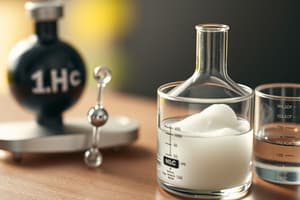Podcast
Questions and Answers
What is melting?
What is melting?
Solid changing into a liquid
What is freezing?
What is freezing?
Liquid changing into a solid
What is condensation?
What is condensation?
Gas/vapour changing into a liquid
What is evaporation?
What is evaporation?
What is the melting point?
What is the melting point?
What is the freezing point?
What is the freezing point?
What is the boiling point?
What is the boiling point?
What is diffusion?
What is diffusion?
What is filtration?
What is filtration?
What is a filtrate?
What is a filtrate?
What is a solute?
What is a solute?
What is a solution?
What is a solution?
What is a solvent?
What is a solvent?
What is fractional distillation?
What is fractional distillation?
What is galvanization?
What is galvanization?
What is atomic number/proton number?
What is atomic number/proton number?
What is an atom?
What is an atom?
What is mass number/nucleon number?
What is mass number/nucleon number?
What is the nucleus?
What is the nucleus?
What is an isotope?
What is an isotope?
What is an element?
What is an element?
What is a compound?
What is a compound?
What is a mixture?
What is a mixture?
What is a group in the Periodic Table?
What is a group in the Periodic Table?
What is a period in the Periodic Table?
What is a period in the Periodic Table?
What is ionic bonding?
What is ionic bonding?
What is covalent bonding?
What is covalent bonding?
What is metallic bonding?
What is metallic bonding?
What is an ion?
What is an ion?
What is a molecule?
What is a molecule?
What is the rate of reaction?
What is the rate of reaction?
What is a catalyst?
What is a catalyst?
What is an enzyme?
What is an enzyme?
What is relative formula mass?
What is relative formula mass?
What is a mole?
What is a mole?
What is an exothermic reaction?
What is an exothermic reaction?
What is an endothermic reaction?
What is an endothermic reaction?
What is pH?
What is pH?
What is a base?
What is a base?
Flashcards are hidden until you start studying
Study Notes
Phase Changes
- Melting: Transition from solid to liquid.
- Freezing: Transition from liquid to solid.
- Condensation: Gas or vapor converts to liquid.
- Evaporation: Liquid transforms into gas or vapor.
Temperatures and Points
- Melting Point: Specific temperature where solid becomes liquid.
- Freezing Point: Specific temperature where liquid turns into solid.
- Boiling Point: Temperature at which a liquid vaporizes at atmospheric pressure.
Mixtures and Separation Techniques
- Diffusion: Movement of particles from high to low concentration.
- Filtration: Method to separate insoluble solids from liquids.
- Filtrate: Liquid that has passed through a filter.
- Fractional Distillation: Process that separates liquids based on different boiling points.
Solutions
- Solute: Substance being dissolved in a solvent.
- Solution: Mixture created when solute dissolves in solvent.
- Solvent: Liquid that dissolves the solute.
Chemical Processes
- Galvanization: Protective coating of iron using zinc to prevent rusting.
Atomic Structure
- Atomic Number/Proton Number: Counts number of protons in an atom.
- Atom: Smallest unit of an element with distinct properties.
- Mass Number/Nucleon Number: Total of protons and neutrons in an atom.
- Nucleus: Core of an atom, housing protons and neutrons.
- Isotope: Variants of an element with the same protons but different neutrons.
Types of Matter
- Element: Pure substance consisting of one type of atom.
- Compound: Substance formed by chemical union of two or more different atoms.
- Mixture: Combination of different components not chemically bonded.
Periodic Table Organization
- Group: Columns indicating the number of electrons in the outer shell.
- Period: Rows indicating the number of electron shells in an atom.
Chemical Bonding
- Ionic Bonding: Strong attraction between oppositely charged ions.
- Covalent Bonding: Attraction formed by shared pairs of electrons and atomic nuclei.
- Metallic Bonding: Attraction between positive metal ions and delocalized electrons.
Particles and Molecules
- Ion: Charged particle from ionic bonding, unequal protons and electrons.
- Molecule: Neutral particle formed through covalent bonding.
Reaction Dynamics
- Rate of Reaction: Change in concentration of reactants/products over time; more frequent collisions yield a faster reaction.
- Catalyst: Substance that accelerates a reaction without altering itself; reduces activation energy.
- Enzyme: Biological catalyst, e.g., Amylase.
Mass and Moles
- Relative Formula Mass: Total atomic masses of elements in a compound.
- Mole: Amount of substance containing Avogadro's number (6.02 x 10^23) of molecules or atoms.
Energy Changes in Reactions
- Exothermic Reaction: Reaction that releases heat; indicated by negative ΔH.
- Endothermic Reaction: Reaction that absorbs heat; indicated by positive ΔH.
pH Scale and Bases
- pH: Scale from 0 to 14 indicating acidity, neutrality, or alkalinity of a solution.
- Base: Substance with pH above 7, reacting with acids to produce salts.
Studying That Suits You
Use AI to generate personalized quizzes and flashcards to suit your learning preferences.




